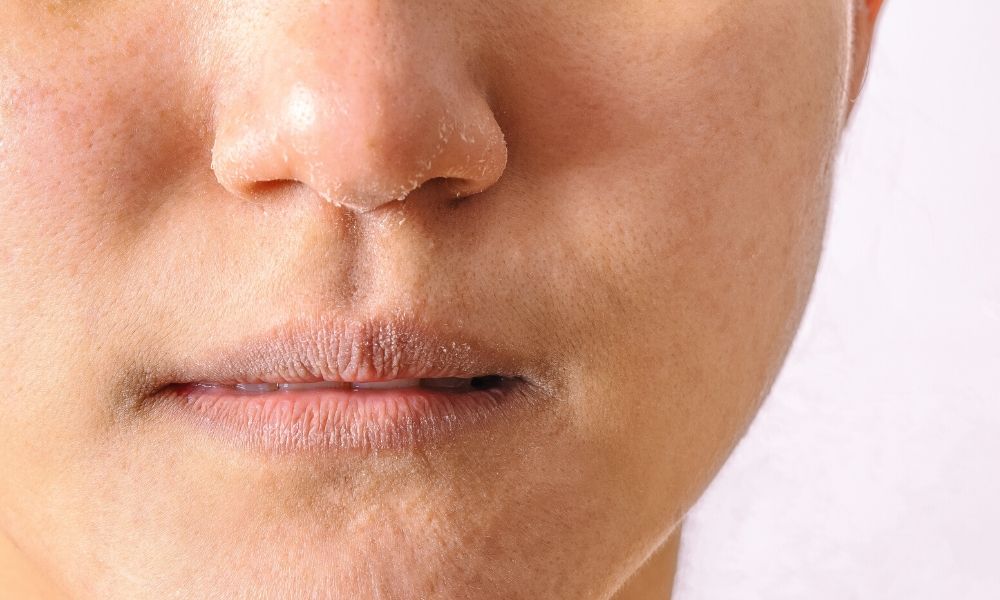A dry nose may seem like a small inconvenience, but anyone who has dealt with persistent nasal dryness knows how uncomfortable it can get. Whether it’s caused by cold weather, indoor heating, allergies, or long-term mask use, dry nasal passages can lead to irritation, cracking, crusting, and even nosebleeds. In more severe cases, dryness can increase susceptibility to conditions like nasal vestibulitis or ongoing inflammation.
The good news is that simple moisturization—done correctly—can maintain nasal comfort, strengthen the protective lining of the nose, and reduce the risk of more serious issues. Here’s an in-depth look at why nasal dryness happens and the best ways to keep your nasal passages comfortably hydrated.
Why Does the Nose Become Dry?
The nose is designed to stay moist. Its lining produces mucus that traps dust, pollutants, and pathogens while warming the air you breathe. When this natural moisture barrier is disrupted, symptoms like burning, itching, and crusting can follow.
Common causes include:
Low Humidity
Cold climates, heated indoor air, and air-conditioned spaces all strip moisture from the nasal lining.
Allergies and Irritants
Pollen, dust, or smoke can inflame the nasal passages and reduce mucus production.
Medications
Antihistamines, decongestant sprays, and certain asthma medications often contribute to dryness.
Respiratory Infections
Even mild infections can disturb the balance of moisture in the nose.
Underlying Conditions
Chronic dryness may be connected to conditions like dry sinuses or inflammation of the nasal vestibule.
Why Nasal Moisturization Matters
Keeping the inside of the nose hydrated is essential for maintaining healthy respiratory function. Moisture supports:
- Proper mucus flow
- A protective barrier against pathogens
- Reduced friction inside the nostrils
- Faster healing of minor irritation or abrasions
When the nose becomes too dry, its ability to filter and humidify the air you breathe is compromised, which can trigger discomfort and secondary issues.
The Most Effective Ways to Moisturize a Dry Nose Use a Nostril Moisturizer
A nostril moisturizer helps restore hydration and soothe irritated tissues. Options range from saline-based sprays to thicker gels and natural oils. Choosing the right texture and formulation depends on how long-lasting you want the moisture to be and how sensitive your nose is.
Increase Humidity
A humidifier, especially during winter or in air-conditioned rooms, helps prevent nasal dryness throughout the day and night.
Stay Hydrated
Drinking water plays a surprisingly big role in maintaining mucus consistency.
Avoid Overuse of Decongestant Sprays
Extended use of medicated sprays can worsen dryness, so they should be used sparingly.
Natural Oils for Nasal Moisturization
For individuals who prefer natural solutions or suffer from recurring irritation, plant-based oils can be helpful. Sesame oil, coconut oil, and rose geranium oil are commonly used because they coat the nasal lining without overwhelming it. Oils can support the skin barrier, reduce friction, and provide a more lasting layer of hydration than saline sprays alone.
A Gentle Option: Narisure Dry Nose Relief
Among the moisturizing options available, one formulation often noted for its natural approach is Narisure Dry Nose Relief. It contains sesame oil, vitamin E, and rose geranium oil—ingredients that have been traditionally used to support dry and sensitive skin.
For those looking for a natural nasal hydration method, this option may offer a simple and gentle approach. You can learn more about its formulation on the product page for the best nasal moisturizer.
When Dry Nose Becomes a Recurring Problem
While occasional dryness is normal, chronic discomfort or cracking deserves closer attention. In some cases, persistent dryness may be related to inflammation, infection, or environmental factors that require adjustment. If dryness leads to ongoing scabbing, pain, or irritation around the nostrils, it may indicate a condition such as nasal vestibulitis.
People dealing with long-term symptoms should also watch for the signs associated with dry sinuses, as these often overlap with nasal dryness and may affect breathing comfort.
Final Thoughts
Dry nasal passages don’t have to be a daily struggle. With consistent hydration, awareness of environmental triggers, and the right nostril moisturizer, you can restore comfort and help protect the delicate lining of your nose. Small changes—like increasing humidity, staying hydrated, or using a gentle natural moisturizing oil—can make a noticeable difference.
Keeping your nose healthy goes beyond comfort. When your nasal passages stay moist, they perform their essential functions better, allowing you to breathe, sleep, and move through your day with greater ease. If dryness becomes frequent or severe, exploring your triggers and using a proper nasal moisturizer can offer long-term relief and help prevent further irritation.







